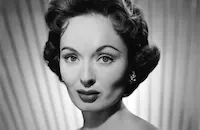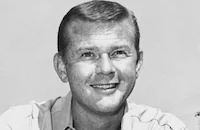Our Very Own

Brief Synopsis
Cast & Crew
Dave Miller
Ann Blyth
Farley Granger
Joan Evans
Jane Wyatt
Ann Dvorak
Film Details
Technical Specs

Synopsis
Gail Macaulay, who lives in Los Angeles, California, is about to graduate from high school. She is going steady with a handsome young television deliveryman named Chuck, but her younger sister Joan has a crush on him and is jealous of their relationship. On Gail's eighteenth birthday, she and Chuck take his delivery truck to a secluded section of the beach and declare their love for each other. Meanwhile, Joan asks her mother Lois for her birth certificate so she can get a summer job, and Lois, who is busy preparing for Gail's birthday party, directs Joan to a box in her dresser. While retrieving the birth certificate, Joan discovers an envelope marked "Gail's adoption papers." Lois suddenly becomes concerned, and when her husband Fred comes home, confesses her fear that Joan saw the envelope. That evening, at the birthday, Joan flirts shamelessly with Chuck, to the annoyance of Gail and her parents. After the party, Gail confronts her sister, and Joan starts to blurt out the truth about Gail's adoption just as their parents enter the room. Fred and Lois ask Gail's forgiveness for not telling her sooner, but Gail goes to her room, brushing aside the remorseful Joan, and removes the engraved locket her parents gave her for her birthday. The next morning, Lois tells Gail that her biological father was killed in an accident before she was born, but her mother is alive. Lois agrees to have their lawyer arrange a meeting with Gail's birth mother, but decides to visit the woman, Gert Lynch first. Gert, who lives in the poor section of Long Beach, is moved to tears when Lois shows her pictures of Gail, but says that her husband Jim must never find out that she had a child. Lois arranges for Gail to meet Gert the following evening, when Jim is out bowling. The evening of the meeting, Chuck comes by, but Gail leaves him with little explanation and drives away with her friend, Zaza Brooks. While the girls are on the road, Lois gets a panicked call from Gert, who says her husband canceled his bowling game and is bringing friends over to play cards. On Lois' advice, Gert waits outside her home, but Jim calls her in to prepare refreshments just as Gail and Zaza arrive. Gail enters the smoky, crowded house, and Gert nervously pretends before her husband and guests that Gail is the daughter of an old friend. After trying unsuccessfully to find a place where they can speak privately, Gert explains the situation and apologizes. Gail returns to the car and lies to her friend about how well the reunion went, then asks to spend the night with Zaza. Lois and Fred worry when Gail fails to return, and Chuck goes to Zaza's house and reproaches Gail for turning her back on those who love her. The day of the high school graduation arrives, and Gail is surprised to learn that Zaza's wealthy father is skipping the ceremony to attend a party out of town. At the commencement ceremony, Gail is called up to give her speech on the privilege of citizenship, and delivers the speech with great dignity, imbuing it with a touching message about the true meaning of family. Afterward, Gail joyfully embraces her parents and sisters, and she and Chuck kiss.

Director

Dave Miller
Cast

Ann Blyth

Farley Granger

Joan Evans

Jane Wyatt

Ann Dvorak

Donald Cook

Natalie Wood
Gus Schilling

Phyllis Kirk
Jessie Grayson

Martin Milner
Rita Hamilton

Ray Teal
Crew
Jerry Bryan
Marie Clark
Sidney Cutner
Richard Day
Edward Elgar
Lee Garmes
Ed Garvin
Samuel Goldwyn
Samuel Goldwyn
F. Hugh Herbert
Julia Heron
Ralph Hoge
Vic Jones
Fred Lau
William Mcgarry
John Miehle
Raoul Pagel
Batami Scheider
Leo Shuken
Blagoe Stephanoff
Sherman Todd
Harry Webb
Mary Wills
Victor Young

Videos
Movie Clip



Film Details
Technical Specs

Award Nominations
Best Sound
Articles
Our Very Own
The idea had come from playwright F. Hugh Herbert, who had scored on Broadway, radio and screen with Kiss and Tell (1945), the adventures of irrepressible teen Corliss Archer (played on screen by Shirley Temple), caught up in keeping her GI brother's marriage to her best friend secret. This time Herbert wanted to deal with a more serious topic, an adopted girl's search for her birth parents, and Goldwyn thought he could make it work.
Goldwyn had two younger actors, Farley Granger and Joan Evans, already under contract. They had teamed romantically in Evans' debut film, Roseanna McCoy (1949), but this time they would merely be co-stars, with Evans as the leading lady's younger sister. For the film's lead, Goldwyn borrowed MGM contract player Ann Blyth, who, though mostly cast in sympathetic teen roles, was best known as Joan Crawford's despicable daughter in Mildred Pierce (1945).
For contemporary fans, however, the real names in the cast fall among the supporting ranks. As Blyth's youngest sister, a precocious busybody, Goldwyn cast Natalie Wood, then under contract at 20th Century-Fox. Off-screen, Wood was quiet and withdrawn, and instructed to speak to no one but the director by her mother. On-screen, though, she surprised her co-stars with the vehemence with which she tackled her role. They were also surprised to learn that she was actually older than her mother let on. Although already eleven, she was small enough to pass for nine, an illusion her mother was happy to perpetuate if it got her more roles. The ploy didn't work, however. As Hollywood's studios cut back on production in the '50s, Wood's Fox contract would be canceled after her next film, leaving her a free agent until she finally achieved stardom as a teenager.
Also borrowed from Fox was Jane Wyatt, cast as Blyth's adoptive mother. Wyatt was disappointed at not getting more of the famed "Goldwyn Touch" in Our Very Own. She was used to more sophisticated roles, usually as romantic interests for stars like Gary Cooper and Cary Grant. Even in smaller parts, she had done some quality film's like Fox's Best Picture Oscar®-winner Gentleman's Agreement (1947). But though Goldwyn hired top talent like cameraman Lee Garmes and composer Victor Young, Wyatt spent her on-screen time offering motherly advice in a succession of housedresses. She didn't think much of the role until years later a visitor to the set who had been impressed by her maternal appearance offered her the lead in a new television series, Father Knows Best. The role would make her a major television star and bring her three Emmys.
One cast member actually gave up what might have been a shot at the big time. Phyllis Kirk was making her screen debut, at 19, in a flashy supporting role as one of Blyth's friends. She had come to Hollywood expecting old-time glamour. Instead, she found herself working on an almost deserted back lot. With little social life, she struck up a friendship with a disheveled older man she saw on the lot every morning, and before long they were sharing breakfast on a regular basis. Although she was signed to make two films for Goldwyn, her agent sent her to a meeting at RKO to discuss possible projects there. When she arrived, she discovered that her breakfast buddy was the studio's owner, Howard Hughes, who now wanted to put her under contract. She had been in town long enough to know that he was running the studio into the ground, however, and turned down the offer, convinced she would do nothing but collect a pay check. Her second film for Goldwyn never materialized.
Goldwyn's gamble on the family audience paid off only modestly. Our Very Own didn't lose any money, but it didn't set any records either. Still, its success was enough to convince him that Granger had arrived as a teen heartthrob (he conveniently forgot Granger's success at other studios in films like Rope and They Live by Night, both 1948). He would rush Granger and Evans into another teaming, a melodrama called Edge of Doom (1950), before losing interest in them. He would drop Evans' contract altogether, while continuing to turn a profit by loaning Granger to other studios.
Producer: Samuel Goldwyn
Director: David Miller
Screenplay: F. Hugh Herbert
Cinematography: Lee Garmes
Art Direction: Richard Day
Music: Victor Young
Cast: Ann Blyth (Gail Macaulay), Farley Granger (Chuck), Joan Evans (Joan Macaulay), Jane Wyatt (Mrs. Fred Macaulay), Ann Dvorak (Mrs. Gert Lynch), Donald Cook (Fred Macaulay), Natalie Wood (Penny Macaulay), Phyllis Kirk (Zaza), Martin Milner (Bert), Ray Teal (Mr. Jim Lynch).
by Frank Miller

Our Very Own
Quotes
Trivia
Notes
The working titles of this film were Beloved Over All and With All My Love. A June 6, 1949 Hollywood Reporter news item reported that David Niven had been cast, but he was not in the film. August 1949 Hollywood Reporter news items add Jimmy Crane, Jacklyn Imoor and Manette Colton to the cast, but their appearance in the final film has not been confirmed. Ann Blyth was borrowed from Universal-International for this production. Our Very Own marked the motion picture debut of actress Phyllis Kirk (1929-2006) and was David Miller's first directing assignment for Samuel Goldwyn.
The film was nominated for an Academy Award for Best Sound Recording. Modern sources add Harold Lloyd, Jr. to the cast. Farley Granger and Joan Evans repeated their roles on a Lux Radio Theatre broadcast on June 11, 1951, with Diana Lynn in the role created by Ann Blyth. Our Very Own was also broadcast on the Lux Radio Theatre on October 5, 1953, with Joan Evans, Robert Wagner and Terry Moore.














